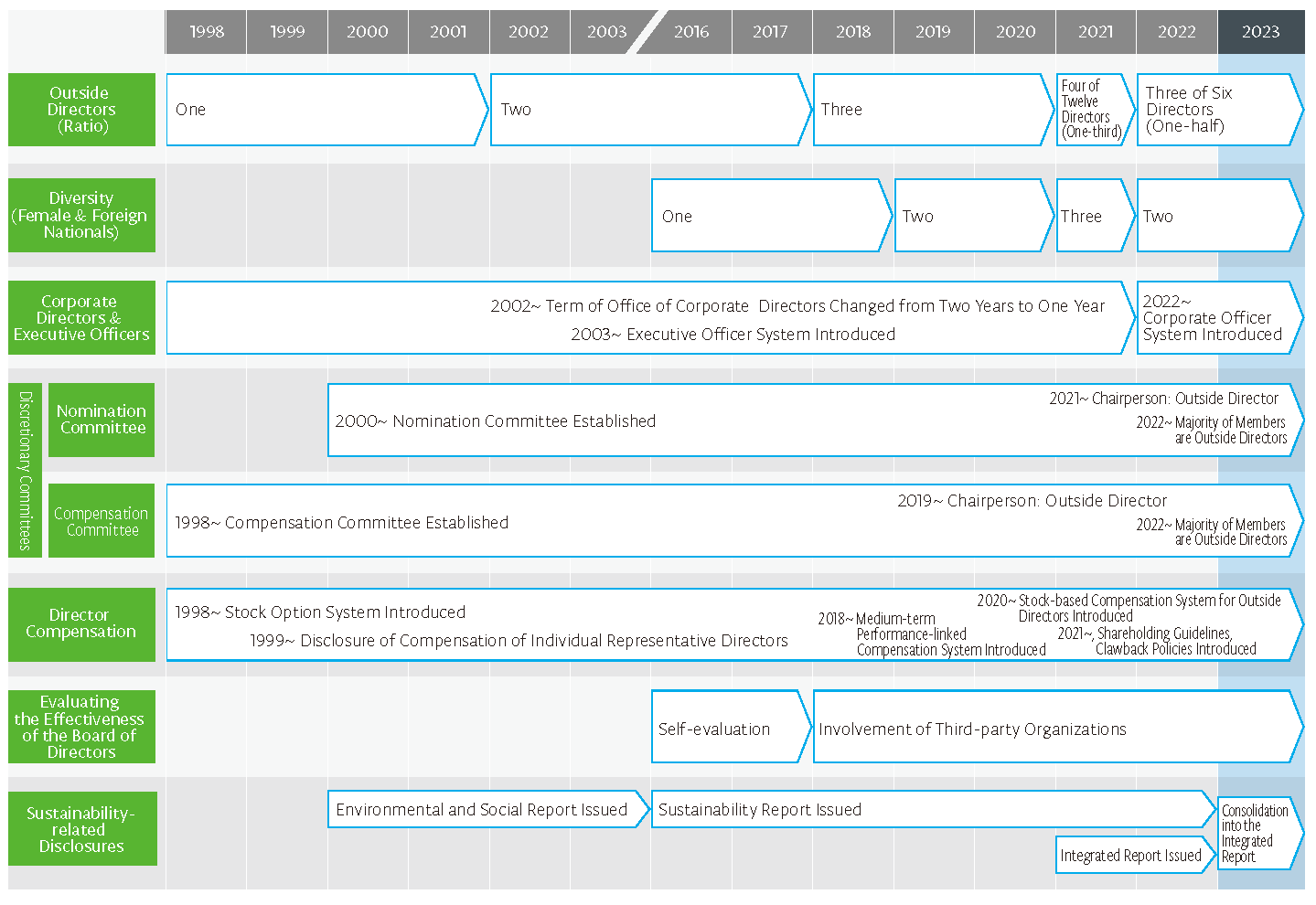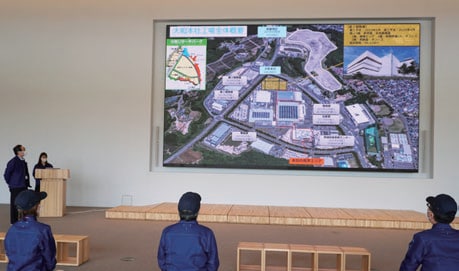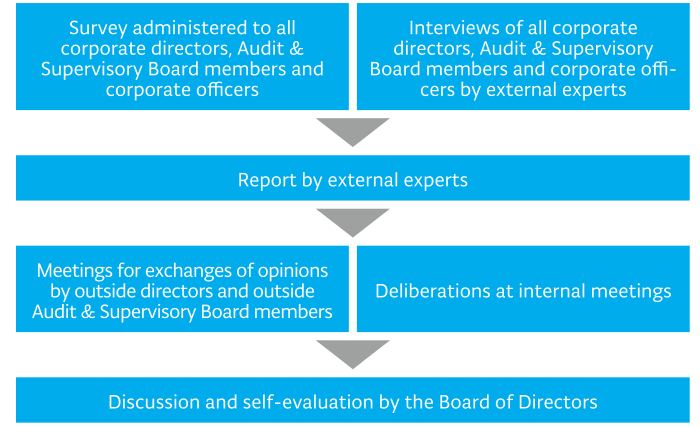Corporate Governance
Corporate Governance System
Basic Stance
Tokyo Electron regards the improvement of its corporate governance structures as important for achieving success in global competition and realizing sustainable growth. To that end, we have built a structure which utilizes to the maximum the worldwide resources we possess and have worked to incorporate a wide range of opinions to strengthen our management foundation and technology base, establishing a governance structure capable of ensuring that we attain global-level earnings power. We have established the Corporate Governance Guidelines* and outlined the corporate governance structures that we have developed and reinforced to date, in advance of other companies.
We use the Audit & Supervisory Board System, which consists of a Board of Directors and an Audit & Supervisory Board, and have achieved effective governance based on the supervision of management by the Audit & Supervisory Board.
Characteristics of Our Corporate Governance
Changes in Corporate Governance (Since CY1998)

Corporate Governance Framework
Committees on the Executive Side
About Corporate Officers
As a leading company in the semiconductor production equipment industry, where technological innovation is rapid and market changes are active, we introduced our unique Corporate Officer system in June 2022 to further strengthen governance and implement quick decision-making agile operational execution. Corporate officers are the highest-level officers on the executive side within the Group; unlike executive officers, who have responsibility for particular areas, corporate officers have responsibility for the management of the entire company, taking the same perspective as the CEO. Corporate officers also attend Board of Directors meetings, where they give briefings on operational execution, to ensure that the Board of Directors is able to supervise the executive side in an appropriate manner, and that discussions at the Board of Directors meetings can be put to use appropriately and speedily in operational execution, in order to promote proactive management.
We have also established the Corporate Officers Meeting , the highest-ranking decision-making body on the executive side of the Group. Corporate Officers Meeting sessions are held once a month as a basic principle, with inside directors and inside audit & supervisory board members taking part in addition to six corporate officers; at the sessions, participants help to ensure agile operational execution by deliberating and making decisions on key items on the executive side, including those items for which authority has been delegated from the Board of Directors to the executive side.

Main Topics for the Board of Directors and Off-site Meetings
Off-site Meetings
In addition to the Board of Directors meetings, off-site meetings have been held on two occasions (September 2022 and March 2023), where medium- and long-term growth strategies, financial strategies, capital policy and human resource strategies have been discussed. In March, members also undertook an observation of the Miyagi Technology Innovation Center and other sites at Tokyo Electron Miyagi, where they developed a deeper understanding of the operations while also engaging in dialogue with employees on-site.

Observation of the Miyagi Technology Innovation Center
Establishment of the Director Compensation System
Basic Policy on Director Compensation
The TEL Group emphasizes the following points in its basic policies on compensation for corporate directors and Audit & Supervisory Board members.
- Levels and plans for compensation to secure highly competent management personnel with global competitiveness
- High linkage with business performance in the short term and medium-and-long term increase of corporate value aimed at sustainable growth
- Securement of transparency and fairness in the decision process of compensation and appropriateness of compensation
Compensation Structure
Among corporate directors, compensation for inside directors consists of “fixed basic compensation,” “annual performance-linked compensation” and “medium-term performance-linked compensation.” Compensation for outside directors consisits of “fixed basic compensation” and “non-performance-linked compensation (stock-based compensation).”
Compensation for audit & supervisory board members consists solely of “fixed basic compensation,” in consideration of their role being primarily audit and supervision of management.
The following table sets out an overview of our policies and decision-making methods for each type of compensation.

Evaluating the Effectiveness of the Board of Directors
Overview of Evaluations of Effectiveness
To further enhance our governance and the effectiveness of the Board of Directors, we have conducted annual evaluations of the effectiveness of the Board since fiscal year 2016 and have disclosed summaries of the results.
Since fiscal year 2019, we have used external experts as a third-party organization to verify the status of initiatives relating to issues identified in the preceding fiscal year, identify future issues and work toward continuous improvement.
Evaluation of the Effectiveness of the Board of Directors for Fiscal Year 2023
-
Scope of Evaluation
- Board of Directors Overall (including details of the activities of the Nomination Committee and Compensation Committee)
- Process

-
Evaluation Items
- The main evaluation items for evaluating effectiveness are as follows.
・Overall evaluation
・Composition of the Board of Directors
・Preparation in advance of Board of Directors
・Board of Directors operations
・Deliberations by the Board of Directors
・Roles and operational status of the Nomination Committee and Compensation Committee
・Roles of Audit & Supervisory Board members
・Corporate Officer system
- Initiatives for Issues Identified in Evaluations of Effectiveness in the previous fiscal year
-
Clarification of roles and decision-making authority between the executive side and the Board of Directors
- ・Introduce a Corporate Officer system, and establish Corporate Officers Meetings
- ・Revise the criteria for resolutions of the Board of Directors, and delegate a portion of the matters to be resolved to the Corporate Officers Meeting
- ・Corporate officers attend every meeting of the Board of Directors, and give briefings on the contents of any deliberations at the Corporate Officers Meeting and important matters relatedto the execution of business operations
- ・At off-site meetings, conduct a review following the introduction of the Corporate Officer system and confirm the issues to be considered going forward
-
Continuous deliberations to realize medium to long term growth and ongoing improvements to corporate value
- ・Have the CEO made reports continuously to the Board of Directors on the medium to long term growth strategies, including the progress of the Medium term Management Plan.
- ・Hold off-site meetings on two occasions, with discussions of key measures for accomplishing the Medium term Management Plan and their roadmaps, as well as topics of importance in the medium to long term, including strategies such as diversity and other human resources strategies, capital policy, and risk management.
- ・Have BUGMs ( Business Unit General Managers ) attend the off-site meetings, and exchange opinions with outside directors and outside Audit & Supervisory Board members on the status of operations executed with a view to achieving medium to long term growth strategies.
-
Have information be shared between members of the Board of Directors, and discretionary committees
- ・Have the Nomination Committee report to the Board of Directors regarding the status of its specific activities, including the progress of discussions regarding the succession plan and how to proceed going forward.
- ・Hold meetings outside of the Board of Directors to exchange information between the Chairman of the Board of Directors and outside directors and outside Audit &Supervisory Board members.
Overview of Fiscal Year 2023 Evaluation Results
The Company's Board of Directors believes that the Board of Directors is very effectively ensuring that the key roles and obligations of the Board of Directors are being fulfilled, namely, “establishing management strategy and vision," "making major operational decisions based on strategic direction," and “engaging in constructive, open minded debate” as prescribed in the TEL Corporate Governance Guidelines, and that the Board, including the Nomination Committee and the Compensation Committee are functioning effectively. The results of the analyses and evaluations performed by the external experts also confirmed that the Company’s Board of Directors is functioning effectively, supported by its strengths such as "non-hierarchical, open and natural discussion," "agile execution," and "drive in execution and unity of the management.” On the other hand, based on the analysis and evaluation results of external experts, the Board of Directors shared the intention to further enhance strategic discussions with a view to the future business environment from a longer term perspective as the importance of semiconductors increases.
Future Initiatives
Skills Matrix
We define “Product Competitiveness,” “Customer Responsiveness,” “Higher Productivity” and “Management Foundation,” which supports our overall business activities, as material issues.
We will achieve the medium-term goals in each material issue and realize expanding medium- to long-term profit and continuous corporate value enhancement through each Corporate Director and Audit & Supervisory Board Member, who have demonstrated their skills in Global Business, Governance, Sustainability, and others listed below as determined by the Nomination Committee and the Board of Directors.

Definition of Expected Skills
Diversity of Board Members

Engagement with Capital Markets
Our management actively engages in IR (investor relations) and SR (shareholder relations) activities to contribute to our sustainable growth and increase corporate value over the medium to long term. In terms of IR activities, the CEO and each company’s executive appear at quarterly financial announcement and Medium-term Management Plan briefings to share our business strategies and growth story. We have also established the IR department under the direct control of the CEO to enable deeper discussions with our investors. As a part of our SR activities, company executives play a central role in constructive dialogue with our major investors and proxy advisory firms. In addition to explaining the Shareholders’ Meeting agenda in advance, we engage in repeated dialogue throughout the year on a wide range of topics including corporate governance, our policies about sustainability-related initiatives, the environment, human rights, and diversity and deepen mutual understanding. Opinions gathered from dialogues with investors are regularly reported to management and the Board of Directors.
Fiscal year 2023
